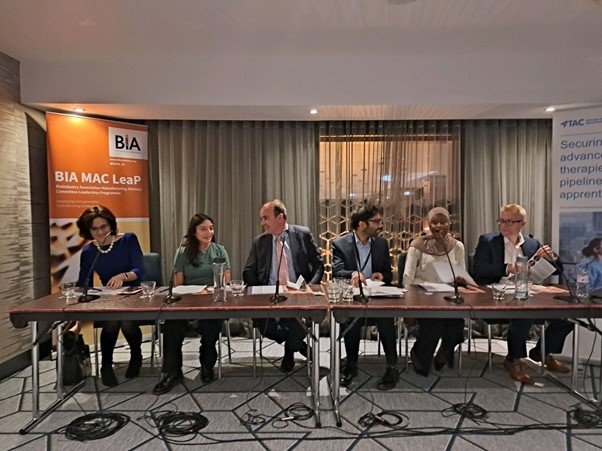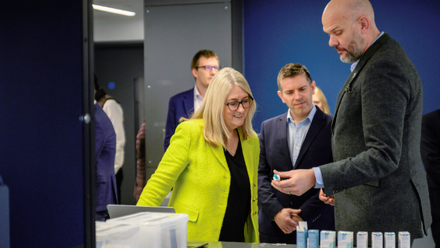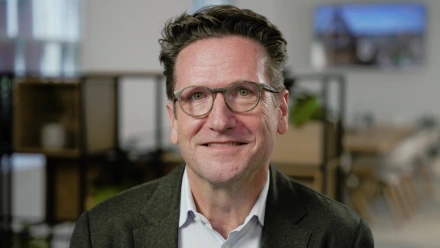Skilled jobs and high growth: the life sciences at party conferences

BIA’s Policy and Public Affairs Executive, Herbie Lambden, shares his reflections on the political party conference season.
This year’s party conference season came at a febrile time in British politics, but also one of great opportunity for our sector. The BIA team was out in force at both the Labour Party conference in Liverpool and the Conservative conference in Birmingham, delivering two exciting panels on life science apprenticeships and soaking up the atmosphere on both sides of the political spectrum.

Figure 1 - Our Liverpool panel. From left to right: David Hunt (AZ), Mike Devey (Pharmaron), Lauren Howe (NHSBT), Chris Thomas (IPPR), Praful Nargund (Starmer's Council of Skills Advisors), Izzy Sloan (GSK)
Exploring life science apprenticeships
Events on the fringes of the conferences allow organisations like the BIA to highlight our key issues to policymakers.
Our panels on ‘Growing innovative manufacturing through apprenticeships’ put apprentices themselves in the limelight as we heard about their own experiences and what more can be done to support this vital pathway into a rewarding job in the life science sector. By bringing in politicians, policymakers, and employers, we were able to have a wide-ranging discussion with BIA members and stakeholders who have the power to make a difference.
As ever, our apprentices provided real insight into the lived experience of life science apprenticeships. Making a direct comparison with her peers at the University of Kent, Imann Bashorun (Oxford Biomedica) told us of the work-ready skills she has gained which are out of reach of those in academia. Mike Devey (Pharmaron) shared how his school presented future options as either university or failure, a false dichotomy which means many apprentices only find their ideal course by chance.
A fundamental cultural and educational shift is needed to reframe apprenticeships, focusing on the unparalleled opportunity to work at the forefront of innovation from day one. In the meantime, exempting apprentices from Council Tax – a perk enjoyed by students – was suggested as a quick policy win that would widen access to apprenticeships for those who might otherwise be excluded.

Figure 2 - Our Birmingham panel. From left to right: Theresa Villiers MP, Emilia Reyes Pabon (Clinical Biomanufacturing Facility), Aaron Bell MP, Aveek Bhattacharya (SMF), Imann Bashorun (OXB), Simon Simpkins (OXB)
Increasing access to apprenticeships and ensuring SME participation was an issue with clear cross-party support. Praful Nargund, member of Keir Starmer’s Council of Skills Advisors, celebrated the BIA’s work on the Advanced Therapies Apprenticeship Community (ATAC) and called for further support to de-risk taking on apprentices for SMEs. In Birmingham, we heard Theresa Villiers MP speak about the contribution apprenticeships can make to levelling up and Aaron Bell MP on the importance of maintaining a skills pipeline into this high-growth industry.
Cutting-edge science means world-leading growth
Both major political parties made it clear that they can see the life science sector’s high growth credentials.
We detected a renewed sense of confidence and direction amongst Labour politicians and delegates in Liverpool, opening new avenues to discuss support for UK life sciences. Keir Starmer’s keynote speech referenced ‘cutting edge science and world-class services driving economic growth’, referring to our sector as part of the party’s vision of a ‘fairer, greener, more dynamic nation’. Shadow Chancellor Rachel Reeves echoed this sentiment in her speech, calling for the creation of a British Sovereign Wealth Fund which will ‘stimulate growth in… life sciences’.
If we needed a reminder of the Government’s support for the sector, it came in the form of a visit from the Prime Minister and Chancellor to the site of the new Birmingham Health and Innovation Campus, due for completion in 2023. Another highlight was the announcement of Nus Ghani MP as our new Minister of State for Science and Investment Security, placing science at the centre of the Government’s business strategy.
The life sciences – not so fringe
Some of the most productive discussions at party conferences came not on the main stage but from venues dotted across Liverpool and Birmingham. These events may be fringe in name, but they certainly weren’t in nature.

Figure 3 - The PM and Chancellor on a visit to the site of the Birmingham Health Innovation Campus (Image source: Independent).
The Conservative conference fringe focused on how our sector can contribute to the Government’s Growth Plan, published last month. We heard George Freeman MP make a clear case for boosting life science clusters across the UK in order to attract investment into the ‘innovation economy’. Michael Gove MP and Lord Bethell spoke at a well-attended IPPR fringe on how health can revitalise the economy, discussing the power of NHS data and the importance of government investment. It sounds like the link between science, innovation and growth will carry much weight for our sector in the coming months.
Health inequalities were a hot topic at the Labour Party conference, with Shadow Health Secretary Wes Streeting MP appearing on a Fabian Society panel to explain the scale of the issue, stressing that preventative healthcare is a major focus for Keir Starmer. With shadow ministers eager to engage with industry, this is a pivotal moment for influencing Labour’s policy development in our area.
Conclusion
For all its eccentricity and media fanfare, party conference season does offer a genuine chance to make our industry heard and influence policy development. The conference saw us engaging with politicians, think tanks, and of course BIA members in a setting known for its ability to shape policy for years to come. It was hugely rewarding to find that politicians from both major parties understand the challenges our sector is facing in the skills space. With further engagement from the BIA and industry, apprenticeships’ place within the life sciences can only be further cemented.






